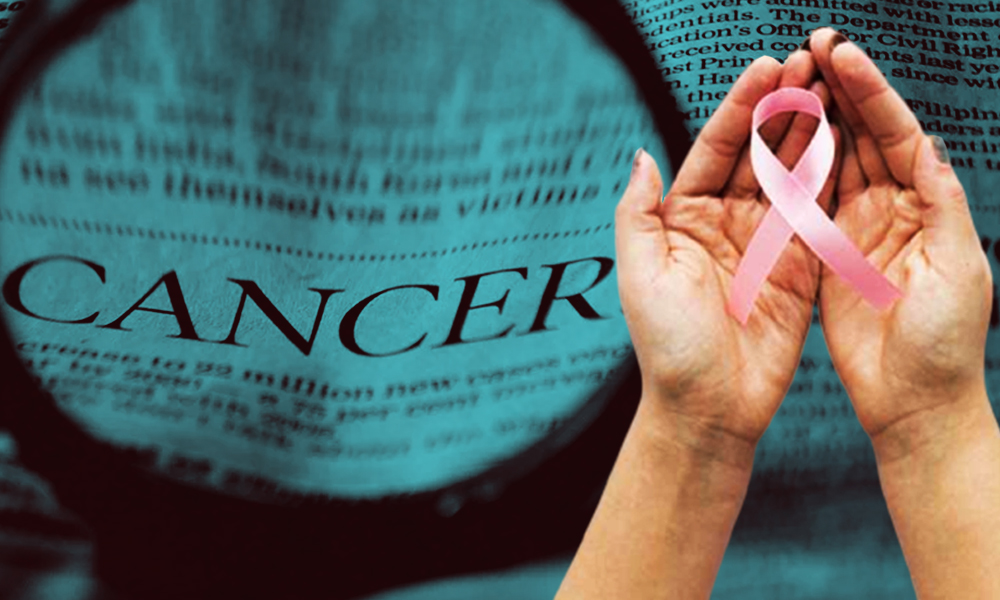
Representational Image
COVID-19 In Cancer Patients: Expert Talks On Risks, Clinical Features, Management
India, 11 May 2021 8:53 AM GMT | Updated 11 May 2021 9:24 AM GMT
Creatives : Rakshitha R |
Rakshitha an engineer turned passionate journalist with an inclination for poetry, creative writing, movies, fiction, mountains and seclusion. Not a part of the social process but existential.
Guest Author : Dr Lohith.G.Reddy
Consultant Radiation Oncologist, Clinical lead - Radiomics, Radiogenomics & Ai, Board of Director-Cvergenx, HCG Hospitals-Bangalore
There is a risk of higher infection rates among Cancer patients undergoing chemotherapy, radiation or immunotherapy due to immunosuppression and can be mitigated by taking appropriate precautions.
COVID-19 is an acute respiratory disease caused by the novel coronavirus SARS-CoV-2 with a total of 150 million people affected with approximately 3.3 million people succumbing to the severe infection. There is a high risk of developing COVID-19 infection among cancer patients, mainly due to the immune suppression caused by cancer as a disease and confounded by treatments such as cytotoxic chemotherapy, targeted therapies, and immunotherapies.
The risk appears to be higher in cancer patients with more than one chronic medical condition such as diabetes, hypertension, chronic renal ailment or ischemic heart disease.
The COVID-19 illness is highly contagious and is transmitted from one person to the other through direct contact of secretions from the respiratory system mainly through coughing, sneezing or droplet infection. The disease has caused an increase in hospitalisation with the need for hospital beds and intensive care unit causing enormous challenges in providing cancer care.
Considerations For COVID-19 And Cancer Patients
Major risk factors for severity and mortality of COVID-19 in cancer patients may include,
- Status of cancer
- Age>60 years
- Performance status
- Smoking status
- Comorbidities such as diabetes, Ischemic heart disease, Asthma
- Type of cancer, such as haematological malignancies or aggressive malignancies
- Cytotoxic chemotherapy, ongoing or received < or equal to 3 months
- Radiation therapy
- Bone marrow or stem cell transplantation < or equal to 6 months, or treatment with immunosuppressive drugs.
- Impaired immune system due to leukocytopenia, low immunoglobulin levels, or long-lasting immunosuppression
Cancer Patients During COVID-19 Pandemic
Due to the immunosuppressive state of cancer patients, most oncologists are informing patients about signs and symptoms of COVID-19 (fever, cough, dyspnea, fatigue) and advocating strong adherence to social distancing principle and wearing masks. To minimize the occupational hazard, the health care workers are urged to wear personal protection equipment (PPE) and maintain health protocols to ensure infection control and avoid nosocomial transmission.
Risk stratification among cancer patients is significant to prevent unnecessary COVID-19 infection in hospital settings. Accordingly, the patients on intravenous chemotherapy can be switched to appropriate oral chemotherapy if feasible, on a case by case basis, with multidisciplinary team decisions to start anti-cancer treatment. Also, symptom management and chemotherapy supervision using telemedicine are preferred.
The patients receiving curative radiation therapy are encouraged to continue and whenever feasible, a hypofractionated regimen is preferred to shorten the overall treatment time. Cancer care interventions can be avoided for patients who are clinically stable or those requiring symptomatic or palliative care during the peak of the virus epidemic.
Cancer In Older Patients:
Older cancer patients have a higher risk of respiratory complications and death following the viral infection. Hence, increased barrier methods like wearing masks and hand hygiene should be encouraged for them. It is being advocated that older cancer patients should not be excluded from the oncological care with the theory of their impending risk of severe disease when infected with COVID-19.
COVID-19 Testing In Patients With Cancer:
Symptomatic patients should be isolated and tested. If results are positive for SARS-CoV-2 infection, the patient should be moved to the COVID-19 disease treatment unit according to the safety protocols.
Due to the potential risk of poor outcomes clinically in the setting of neutropenia and/or during the perioperative period, the standard recommendation at present is performing molecular diagnostic testing for SARS-CoV-2 prior to procedures that require anaesthesia and before initiating cytotoxic chemotherapy, long-acting biologic therapy or radiotherapy.
Vaccination For SARS-CoV-2 In Patients With Cancer:
Presently, the government authorized SARS-CoV-2 vaccines can be safely administered to immunocompromised people, given the effectiveness of the SARS-CoV-2 vaccines in the general population and due to increased risk of severe COVID-19 acute respiratory distress syndrome and associated increased death in patients with cancer. It is recommended to administer SARS-CoV-2 vaccination for patients with active cancer presence or patients who are receiving treatment for cancer.
When To Get SARS-CoV-2 Vaccination:
- To complete the vaccination schedule of 2 doses at least 2 weeks before starting chemotherapy or radiotherapy.
- In patients with hematologic malignancy with dose-intensive chemotherapy, vaccination should be delayed until neutrophil recovery.
- Vaccination of caretakers, relatives, close contacts, and health care providers who provide care for immunocompromised patients is imperative to protect the patients from infection.
Conclusion:
Management of cancer patients during the COVID-19 pandemic is challenging. The need for active cancer care with multimodality treatment with surgery, chemotherapy or radiation therapy places the patients at risk of severe COVID-19 infection leading to acute respiratory distress syndrome.
The immunosuppressive effect of chemo-radiation may increase the debility and death rates associated with the COVID-19 virus. Therefore, cancer treatment should be stratified based on the benefits and risk of interventions. Avoiding unnecessary procedures, social distancing, hand hygiene and mask wear could reduce the associated disease burden.
(With inputs from Dr Krithikaa Sekar, Consultant Radiation Oncologist, HCG Hospitals-Bangalore)
Also Read: GST Waiver On COVID-19 Vaccine, Drugs Will Make Them Costlier: FM Sitharaman
 All section
All section














